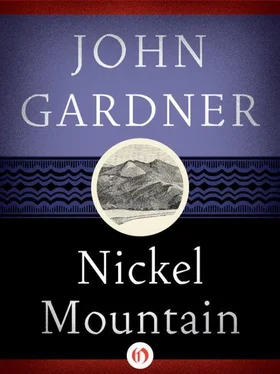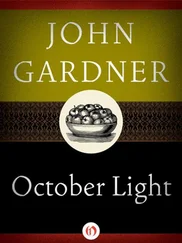George said, “Why not you, Henry?”
He clenched his fist. “I’m twenty-five years older than she is, that’s why. And fat and ugly to boot.”
“But you love her,” George said, grinning like a cat.
“Love her, hell! I’ll be dead inside a year. Doc Cathey said so.”
“But you love her,” George said, dead serious all at once.
It suddenly came to Henry that that was true. “Maybe so,” he said. He drank. The next instant Henry felt faint, then violently sick, some sudden incredible explosion of, maybe, indigestion, and George jumped up and came around to him.
When he woke up he was in George Loomis’s bed and Doc Cathey was over by the window. When Henry moved his hand Doc Cathey whirled and pointed at him. “Lie still, you damn fool,” he shouted. “You stay like you are or I’ll cave in the side of your head.”
He didn’t know and didn’t ask whose idea it was that Callie move in to look after him. She hung a curtain across the corner of his room behind the diner and put a cot there for herself, and she fed him and looked after him as if she were his slave, or maybe his mother. If he moaned in the middle of the night, bothered by dreams, or if he woke up suddenly and stirred in his bed, she’d be there in a minute with one of the six different pill bottles. He did whatever she told him to do, not because Doc Cathey had told him to on pain of death but because he liked to, at least for now. During the day she’d come in to see him from time to time, to bring him the paper or see how he was or make sure he didn’t try crossing to the toilet by himself. He felt strong as an ox, and secretly he suspected it was all some kind of plot; but he had no objections. At the end of a week Doc Cathey let him up again, and at the end of two weeks he was doing as much as he’d ever done, except at mealtimes. He had to lose weight, Doc Cathey said, and Callie could see through walls. Then one day Callie took down the curtain and folded up the cot, and that night, when the diner was straightened up, she went home.
Henry Soames felt more lonely than he could remember ever having felt in his life. He sat in his room sunk in despair, and then, wanting no intrusions on his grief, he turned out every light in the place, then sat for a full two hours on the side of his bed, dressed in the old black suit, brooding. Though the room was dark he could make out the lines of the chairs, the tables, the books distinctly. Outside the room he could hear the faint creaking of the pines. Misty rain was muttering on the gravel driveway and the lean-to roof. He breathed slowly.
“I’m sorry,” he thought, thinking of his father and mother, the injustice he’d done them, his presumption that he knew anything at all about their life.
A truck was roaring past, building up speed for the hill. Henry listened, feeling his muscles tighten, then grow limp once more. Useless, he thought. He wouldn’t sleep tonight, not unless he knocked himself out, which perhaps he could do by sitting out in the diner with the fluorescent glaring on the page of some dull old book from his father’s shelf. He slid one foot along the side of the bed, hunting for his slippers, but he didn’t get up. There was a sound then, the rattle of a sudden gust, or perhaps a knock. When the knock came again he recognized it, pushed himself up from the bed, and called, “Come on in. I’ll be right with you.”
“Don’t get up,” Callie said. She was wet, and she was breathing hard; she’d been running. When she reached the door of his room she stopped and leaned on the doorpost. She said nothing for a moment, catching her wind. Then: “I’m sorry to bother you. I saw your lights were all off, and I thought—”
Henry looked down.
She came into the room and stood by the window. She rubbed the back of a book with her thumb, making the binding gleam, but her eyes did not seem focused on the book. Henry watched the self-conscious movements of her hands. He would hurry her home before her parents woke to worry, he thought.
“You want to sit down, Callie?”
She’d left the door of the diner open, and he could feel cool air sweeping across his chest and back. The rain had stopped now. She went on rubbing the book, looking at nothing.
“What is it, Callie?” he said.
Then suddenly she came to him and pressed her wet head against his chest, her fingers digging into his fat. Her back under his hands shook with her sobbing. As always, only his hands could communicate. “He’s a good boy, Callie, and you love him,” he was whispering hurriedly, senselessly now, as though the weighted heat in his chest could be pushed off by words. He’d said these words before with her wet hair against his shirt; but no, that was wrong. Never. And yet she was looking up now as he’d known she would, saying, “No, I don’t. I didn’t. Stop talking, Mr. Soames. Please. I hate you when you talk. I can’t help it, I truly hate you. I’m sorry.” Her face was close, and she hissed it at him, every word increasing the heat in his chest. He thought, if only she could get away someplace, to rest and straighten things out in her mind. He had money, after all; all the money she would need.
She said, “When I saw your light was off I was certain something had happened to you. I couldn’t stand it, you’ve been like a father to me, almost like—” She broke off. His hands stopped moving on her back. After a long time she said, “Mr. Soames, have I led you to believe—?” She drew back, looking at him, frightened.
“It’s all right, Callie,” he said. “It’s nothing, nothing.” His lips were trembling, stretching out like a sad clown’s, and he remembered that with his glasses on he looked like a Russian spy. She pressed close to him again, clinging to him as if in horror. “Oh, boy,” she whispered. And then, as if on second thought, “Oh, Holy God.” The burning in his chest was like fingernails cutting into his skin, blocking out the light and the candle flame and the blistered, dirty, brown-paper shine of the old hotel room walls. Her hands had gone limp with the pain, he remembered all at once, and yet even while she sobbed she had reached for his hand. It came to him now why she’d laughed.
“I love you, Callie.”
“I shouldn’t have come,” she said. “I was out of my mind.”
“I know how you feel, Callie. I only wanted—”
“You don’t know how I feel at all. Let me think.”
The fog had pounced suddenly, from nowhere. Henry sat for five or six minutes at the end of his driveway, just off the macadam, his arms resting over the steering wheel. The girl, wrapped in an old army blanket, sat hugging her knees, breathing deeply, like a child. Her face, framed by the window, was gray as lead. The Ford’s headlights seemed to bore only a few inches into the fog. Gray, airy arms moved over the hood and seemed, sometimes, to be lifting the car, turning it so that Henry wouldn’t know where the highway lay. A drunk was knocking at the front door of the Stop-Off, shouting, “Henry, hey, Henry, git up!” Henry kept from turning his head. Somewhere off in the hills to his right a semi whined. Someone he knew, probably, driving against a deadline. A yellow glow appeared on the hill, moved closer, then changed abruptly to a gray-black shadow shooting past to vanish, swallowed up by the fog. The trucker would kill himself, letting her roll that way. Poor bastard. Poor, stupid, vicious, fat bastard. Breathing shallowly to cut down the burning, Henry nudged the Ford out onto 98, heading south — but not for the hills and Nickel Mountain this time — driving into the fog. He’d have to raise Frank Wells and his wife, and get Doc Cathey after that — or no, get Doc in the morning, perhaps; not as a medic for once, thank God. All quickly, before the click.
Читать дальше











